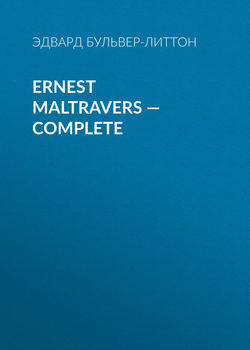Читать книгу Ernest Maltravers — Complete - Эдвард Джордж Бульвер-Литтон, Эдвард Бульвер-Литтон - Страница 20
ERNEST MALTRAVERS BOOK I CHAPTER XVII
Оглавление“There are times when we are diverted out of errors, but could not be preached out of them.—There are practitioners who can cure us of one disorder, though, in ordinary cases, they be but poor physicians—nay, dangerous quacks."
-STEPHEN MONTAGUE.
LUMLEY FERRERS had one rule in life; and it was this: to make all things and all persons subservient to himself. And Ferrers now intended to go abroad for some years. He wanted a companion, for he disliked solitude: besides, a companion shared the expenses; and a man of eight hundred a year, who desires all the luxuries of life, does not despise a partner in the taxes to be paid for them. Ferrers, at this period, rather liked Ernest than not: it was convenient to choose friends from those richer than himself, and he resolved, when he first came to Temple Grove, that Ernest should be his travelling companion. This resolution formed, it was very easy to execute it.
Maltravers was now warmly attached to his new friend, and eager for change. Cleveland was sorry to part with him; but he dreaded a relapse, if the young man were again left upon his hands. Accordingly, the guardian’s consent was obtained; a travelling carriage was bought, and fitted up with every imaginable imperial and malle. A Swiss (half valet and half courier) was engaged, one thousand a year was allowed to Maltravers;—and one soft and lovely morning, towards the close of October, Ferrers and Maltravers found themselves midway on the road to Dover.
“How glad I am to get out of England,” said Ferrers: “it is a famous country for the rich; but here, eight hundred a year, without a profession, save that of pleasure, goes upon pepper and salt; it is a luxurious competence abroad.”
“I think I have heard Cleveland say that you will be rich some day or other.”
“O yes: I have what are called expectations! You must know that I have a kind of settlement on two stools, the Well-born and the Wealthy; but between two stools—you recollect the proverb! The present Lord Saxingham, once plain Frank Lascelles, and my father, Mr. Ferrers, were first cousins. Two or three relations good-naturedly died, and Frank Lascelles became an earl; the lands did not go with the coronet; he was poor, and married an heiress. The lady died; her estate was settled on her only child, the handsomest little girl you ever saw. Pretty Florence, I often wish I could look up to you! Her fortune will be nearly all at her own disposal, too, when she comes of age; now she is in the nursery, ‘eating bread and honey.’ My father, less lucky and less wise than his cousin, thought fit to marry a Miss Templeton—a nobody. The Saxingham branch of the family politely dropped the acquaintance. Now, my mother had a brother, a clever, plodding fellow, in what is called ‘business:’ he became richer and richer: but my father and mother died, and were never the better for it. And I came of age, and worth (I like that expression) not a farthing more or less than this often-quoted eight hundred pounds a year. My rich uncle is married, but has no children. I am, therefore, heir-presumptive,—but he is a saint, and close, though ostentatious. The quarrel between Uncle Templeton and the Saxinghams still continues. Templeton is angry if I see the Saxinghams and the Saxinghams—my Lord, at least—is by no means so sure that I shall be Templeton’s heir as not to feel a doubt lest I should some day or other sponge upon his lordship for a place. Lord Saxingham is in the administration, you know. Somehow or other I have an equivocal amphibious kind of place in London society, which I don’t like; on one side I am a patrician connection, whom the parvenu branches always incline lovingly to—and on the other side I am a half-dependent cadet, whom the noble relations look civilly shy at. Some day, when I grow tired of travel and idleness, I shall come back and wrestle with these little difficulties, conciliate my methodistical uncle, and grapple with my noble cousin. But now I am fit for something better than getting on in the world. Dry chips, not green wood, are the things for making a blaze! How slow this fellow drives! Hollo, you sir! get on! mind, twelve miles to the hour! You shall have sixpence a mile. Give me your purse, Maltravers; I may as well be cashier, being the elder and the wiser man; we can settle accounts at the end of the journey. By Jove, what a pretty girl!”
